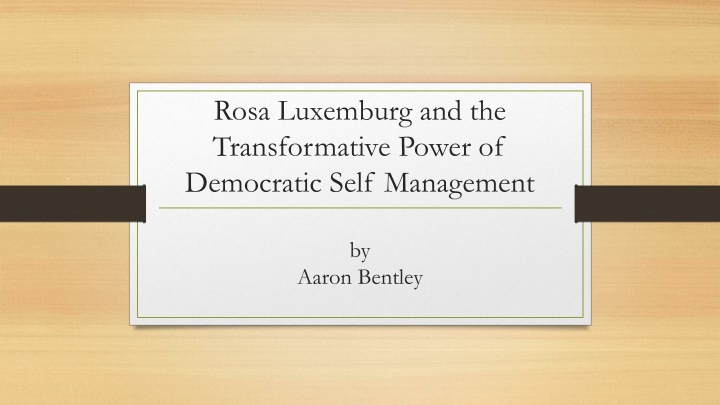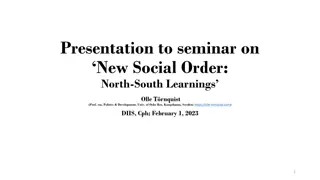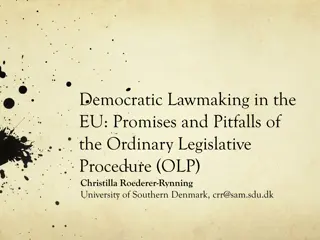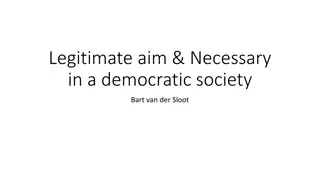Rosa Luxemburg and the Transformative Power of Democratic Self-Management
Discover the insightful analysis of Aaron Bentley on how Rosa Luxemburg's ideas encompass the transformative potential of democratic self-management. Delve into Luxemburg's profound impact, as Bentley navigates the intersection between her theories and the concept of self-management within democratic frameworks. Uncover a fresh perspective on Luxemburg's ideology through this engaging exploration.
Uploaded on Mar 03, 2025 | 2 Views
Download Presentation

Please find below an Image/Link to download the presentation.
The content on the website is provided AS IS for your information and personal use only. It may not be sold, licensed, or shared on other websites without obtaining consent from the author.If you encounter any issues during the download, it is possible that the publisher has removed the file from their server.
You are allowed to download the files provided on this website for personal or commercial use, subject to the condition that they are used lawfully. All files are the property of their respective owners.
The content on the website is provided AS IS for your information and personal use only. It may not be sold, licensed, or shared on other websites without obtaining consent from the author.
E N D
Presentation Transcript
Rosa Luxemburg and the Transformative Power of Democratic Self Management by Aaron Bentley
Talk Outline 1. Luxemburg on Cooperatives a) Progressive and Regressive Social Change b) Practical Barriers 2. New Theories Cooperative Ownership and Worker Self-Management a) Breaking Through the Practical Barriers b) Limits to Progressive Potential 3. Alternative Transformative Uses of Cooperatives
Luxemburg on Cooperatives Luxemburg understands cooperatives as a hybrid form small units of socialized production within capitalist exchange (Luxemburg 2007, 80). A cooperative enterprise socializes only the production of commodities, not their exchange. It does so only for the product and only in the market where the cooperative is located.
Luxemburg on Cooperatives Purported goal of cooperatives as a means of social transformation: To do away with commercial profit. By doing away with commercial profit, put pressure on global capitalism by weakening its hold on the global market. Eventual goal is to simply have all enterprises be cooperatives, and so completely transform the dominant socio-economic organization into socialism by slowly reforming all aspects of production from within the capitalist system.
Luxemburg on Cooperatives Contradiction: If a cooperative exists within a wider capitalist system, members must simultaneously assume both the role of the worker and the capitalist. To succeed in that context, they must either exploit themselves to compete in the exchange market or be uncompetitive in the market and fail (Luxemburg 2007, 80). To avoid this contradiction, [they must remove] themselves artificially from the influence of the laws of free competition (Luxemburg 2007, 81).
Luxemburg on Cooperatives How to artificially remove yourself from the market: Luxemburg s Suggestion: Pair cooperative producers with cooperative consumers to guarantee a market and avoid competition for a market share. AKA create a small unite of socialized exchange to go along with socialized production. Alternative Suggestion: Provide various kinds government sponsored tax or other financial or market incentives to cooperatively enterprises that given them a natural leg up against the competition to compensate for their inability to self-exploit. (Set aside for now. Will return to this later.)
Luxemburg on Cooperatives Luxemburg s argument against the pairing method. Problem of global reach: Consumption coops must be in a position to share the commodities they purchase for consumption within the cooperative, which places limits on their physical distribution, and generally limits their global reach. Problem of limited application: The local model limits what successful coops can produce to things that can be produced and sold locally excluding them from global markets (Luxemburg cites, for example, commercial transportation, mining, petroleum, etc...)
Luxemburg on Cooperatives Sets up cooperatives to primarily compete with local business rather than global capitalism, an attack on the twigs of the capitalist tree (Luxemburg 2007, 82). Implication: Cooperatives will either fail to put pressure on global capitalism or they must push for a regressive form of social transformation, back to more localized merchant economies (Luxemburg 2007, 82).
Luxemburg on Cooperatives Two components of Luxemburg s argument against the transformative potential of cooperatives. Theoretical issues related to the likelihood of regressive as opposed to progressive transformation as the result of political strategies that center cooperatives. Practical issues that arise in virtue of the socio-economic conditions within which they are functioning and either inhibit the successful implementation of a political strategy or push it toward inevitable regress.
Luxemburg on Cooperatives: Progressive and Regressive Social Change Luxemburg adopts a dialectical account of social progress and regress. What constitutes dialectical movement is the coexistence of two contradictory sides, their conflict, and their fusion into a new category. This new fusion unfolds itself again into two new contradictory sides (Marx 1847, 117) Progress involves dialectical social movement through a process of fusion . Regress involves changing back to a prior stage of dialectic development.
Luxemburg on Cooperatives: Progressive and Regressive Social Change Set aside the commitment to dialectics specifically. E.g., my interest in the argument does not depend upon dialectical social metaphysics. Preserve the ontological distinction between progressive and regressive change. Regress as moving toward a past form of social organization with known flaws. Progress as developing a new form of social organization that combines, builds on, and further develops aspects of what worked in past forms of social organization. E.g., preserve the global reach of capitalist economies without preserving the exploitation.
Luxemburg on Cooperatives: Progressive and Regressive Social Change Luxemburg s strategic condition: One should not adopt political strategies that address problematic social conditions through means that produce social regress. A condition on the kinds of social changes and political strategies that should be adopted based upon a normative evaluation of a social ontological distinction between kinds of social change.
Luxemburg on Cooperatives: Socio-Economic Barriers Two kinds: Due to structural features of the extant (capitalist) socio-economic organization. E.g., having to compete in a capitalist market while playing the role of both the capitalist and the laborer. Due to material limitations. E.g., problems of global reach and limited application inhibiting the scale to which a cooperative enterprise can grow under capitalism.
Luxemburg on Cooperatives: Socio-Economic Barriers Both kinds of barrier are used in the argument. The competitive limitations of cooperatives are used to show that cooperatives require market manipulation of some kind to compete with more traditional enterprises. The limits of application are used to show that the forms of market manipulation available limit imply that social transformation based upon cooperatives will be regressive. The development of cooperative enterprises is limited to local markets which prevents them from replacing global domains of production and exchange.
Luxemburg on Cooperatives: Luxemburg s Argument Spelled Out 1. 2. 3. 4. In cooperatives, workers must play contradictory roles as both capitalist and labor. To compete on the global market, cooperatives must then either self-exploit or manipulate the market. Self-exploitation does not transform capitalist social organization. The available forms of market manipulation limit cooperatives to local markets and smaller scale, less globally dependent forms of production. This forces them to compete with local, rather than global capital or replace the global market with mercantilism. Competing only with local markets will not transform capitalism. Transforming society back into a mercantile system is regressive. One should not adopt political strategies that addresses problematic social conditions through social regress. C. Cooperatives should not play a central role in political strategies aimed at socio-economic transformation. 5. 6. 7. 8.
Luxemburg on Cooperatives: Luxemburg s Argument Spelled Out There are several ways one might try to address this argument, but I will discuss two here: 1. That cooperatives need not lead to regressive social organization. 2. That cooperatives can still play a useful role in a political strategy, despite their transformative limitations
Contemporary Approaches of Cooperative Enterprises New work on cooperative enterprises have emphasized on two kinds of issues (Vrousalis 2020, 1): 1. Issues of efficiency (economists): Concerns related to a cooperative s capacity to compete with non-cooperative enterprises on the global market 2. Normative issues (philosophers): Concerns related to the capacity of a cooperative to address the purported normative failings of capitalist enterprises.
Contemporary Approaches of Cooperative Enterprises: Efficiency and Practical Concerns Problems of efficiency are part of the problematic set up by Luxemburg. Premise (2) of Luxemburg s argument claims that cooperatives are risk of being at an efficiency deficit if they fail to either self-exploit or manipulate the market. So contemporary work on problems of efficiency by economists may represent a way to resists to Luxemburg s argument by showing that they do not inevitably lead to social regress AKA may help show that cooperatives do not inevitably lead to regressive social transformation
Contemporary Approaches of Cooperative Enterprises: Normative Concerns Luxemburg s normative concerns regarding cooperatives are quite distinctive. Normative concerns in contemporary literature on cooperatives attempt to show how cooperatives do in fact enable an enterprise to participate in the market in ways that avoid the normatively problematic consequences associated with capitalism, e.g., exploitation and alienation. (Roemer 1994; Schweickart 2011; Vrousali 2020) Luxemburg grants that they can, and then tries to show that the broader normative consequences of a transformative political strategy that centers cooperative enterprises are not what one would hope.
Contemporary Approaches of Cooperative Enterprises: Efficiency and Practical Concerns Outdated material/economic premises: Technological advances like the internet and wider access to more efficient forms of transportation call into question some of Luxemburg s worries about the potential of global scope. E.g. farm sharing, online marketplaces, etc
Contemporary Approaches of Cooperative Enterprises: Efficiency and Practical Concerns Less outdated material/economic premises: Little progress has been made in developing cooperative enterprises in certain economic spheres. Many more globalized cooperative or worker-controlled enterprises still rely capitalist enterprises for global reach/distribution, such as Amazon Marketplace, Etsy, etc and many are still primarily limited to markets already dominated by more wealthy communities (e.g., the United States, Europe, etc...)
Contemporary Approaches of Cooperative Enterprises: Normative Concerns The normative developments regarding the ameliorative potential of cooperative enterprises regarding the exploitation or alienation of workers is already granted by Luxemburg. So, while this work may provide more substantive reason to believe that issues such as self-exploitation can be avoided in cooperatives, it does not address Luxemburg s more strategic normative concern related to progress vs. regress. This indicates that Luxemburg is pointing out a somewhat novel consideration regarding the evaluation of cooperatives as a tool of social transformation.
Contemporary Approaches of Cooperative Enterprises: Normative Concerns This consideration places a burden on those attempting to find ways to manipulate the market in favor of cooperatives or those attempting to show that cooperatives can compete without market manipulation. If one thinks efficiency concerns remain a threat to the potential of cooperatives to compete with global capitalism, then whatever their normative potential otherwise, they become strategically unsound as a transformative strategy.
Alternative Transformative Uses of Cooperatives What are the implications of Luxemburg s argument if it is successful? Cooperatives cannot act as one of the primary means of social transformation, but can they play any other role? Suggestion: Their role is epistemological, rather than metaphysical.
Alternative Transformative Uses of Cooperatives Suggestion: Their role is epistemological, rather than metaphysical. Cooperatives as models used to show potential participants in socially transformative political activity how alternative social arrangements can work. They function as experiments in living in the sense described in (cite Anderson). The improved worker conditions they can provide in the small scale can be used as means of persuading people to support a transformation of the social system either through participation in something like a worker's revolution or through supporting various social policies that encourage and facilitate the transformation of many economic enterprises into worker cooperatives (AKA reform).
Contemporary Approaches of Cooperative Enterprises: Normative Concerns E.g.: Alternative Suggestion: Provide various kinds government sponsored tax or other financial or market incentives to cooperatively enterprises that given them a natural leg up against the competition to compensate for their inability to self-exploit. (Set aside for now. Will return to this later.) But can this be done successfully in a way that does not simply constitute official replacing capitalist markets outright?
Bibliography Gould, Carol C. 2014. Interactive Democracy: The Social Roots of Global Justice. Cambridge: Cambridge University Press. Luxemburg, Rosa. 2007. The Essential Rosa Luxemburg: Reform or Revolution and the Mass Strike. ed. Helen Scott. Chicago, Ill: Haymarket Books. Marx, Karl. 1847. The Poverty of Philosophy. New York: Cosimo, Inc. Roemer, John E. 1994. A Future for Socialism. Politics & Society 22(4): 451 78. Schweickart, David. 2011. After Capitalism. Plymouth: Rowman & Littlefield Publishers. Sharzer, Greg. 2017. Cooperatives as Transitional Economics. Review of Radical Political Economics 49(3): 456 76. Vrousalis, Nicholas. 2020. Public Ownership, Worker Control, and the Labour Epistocracy Problem. Review of Social Economy 0(0): 1 15.























